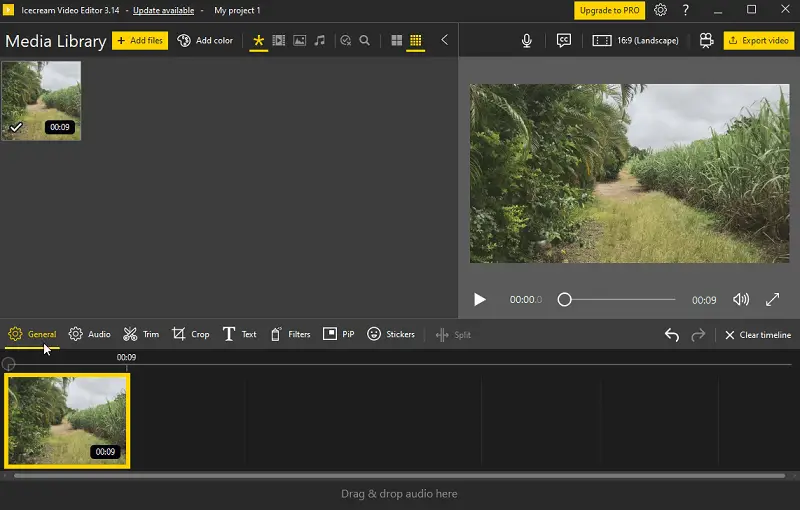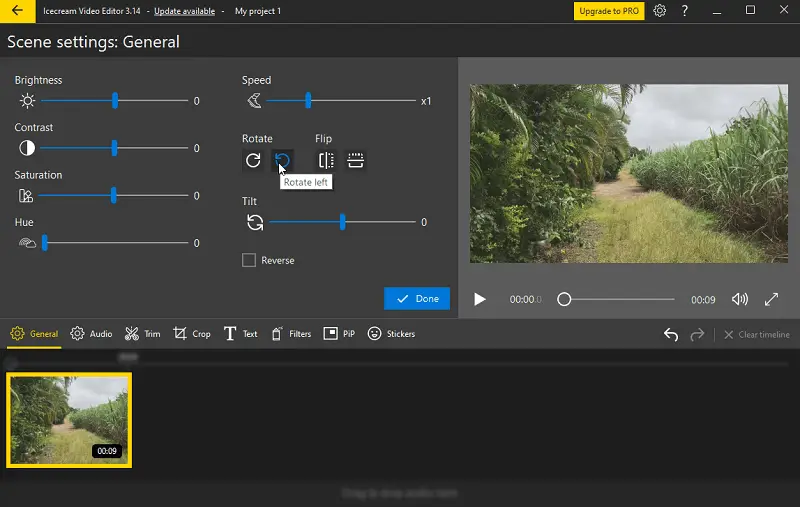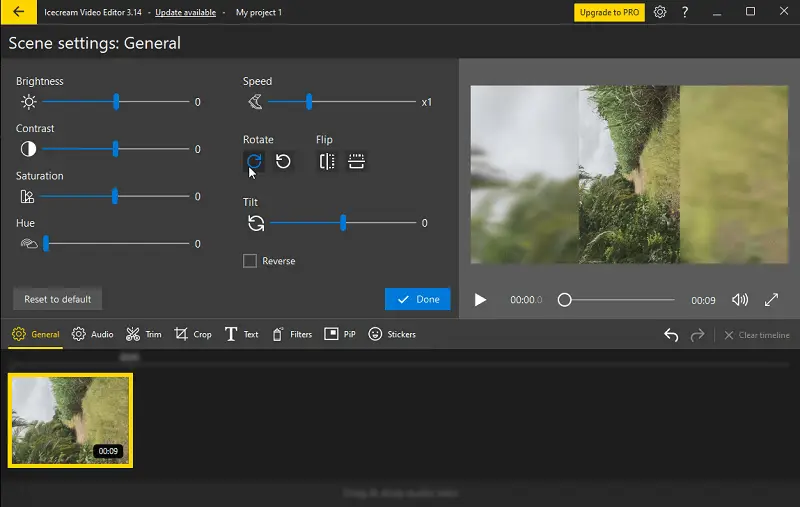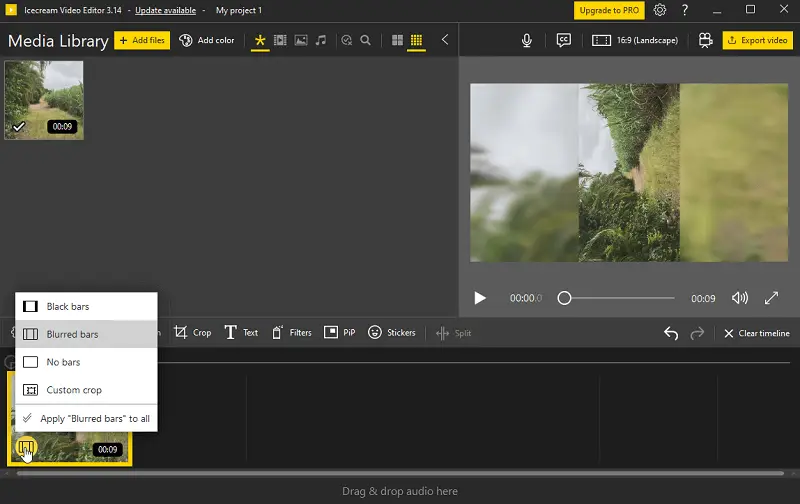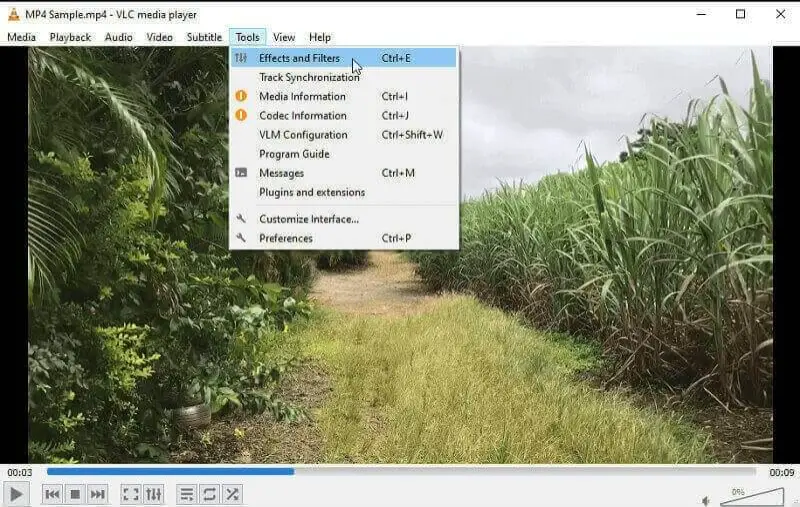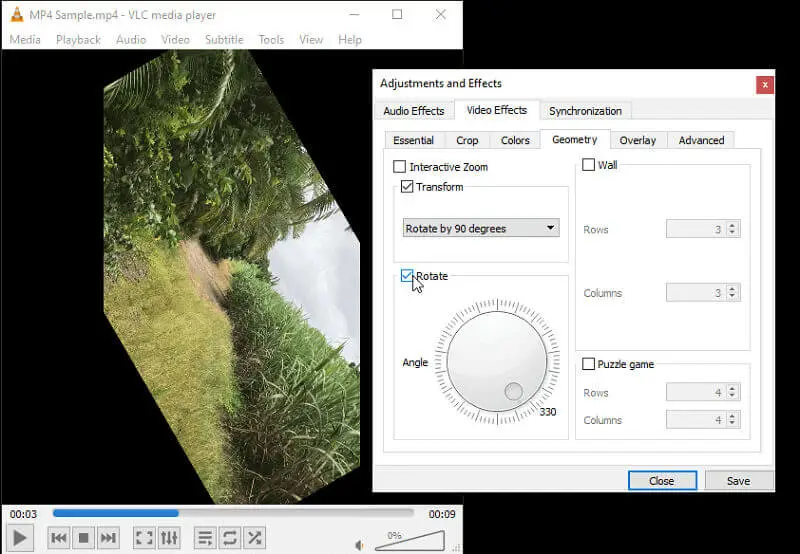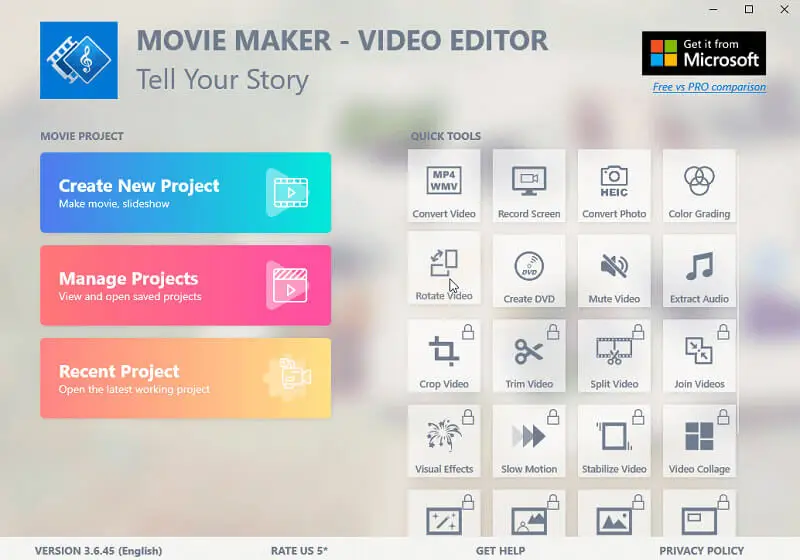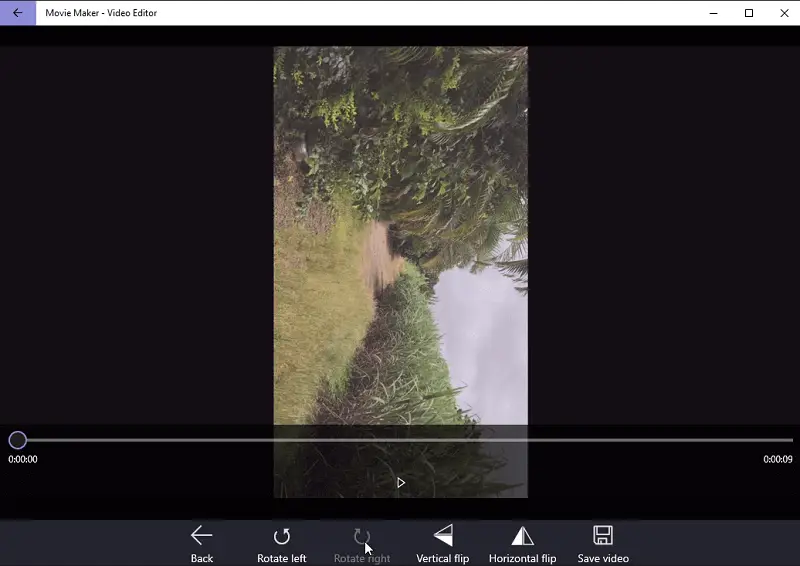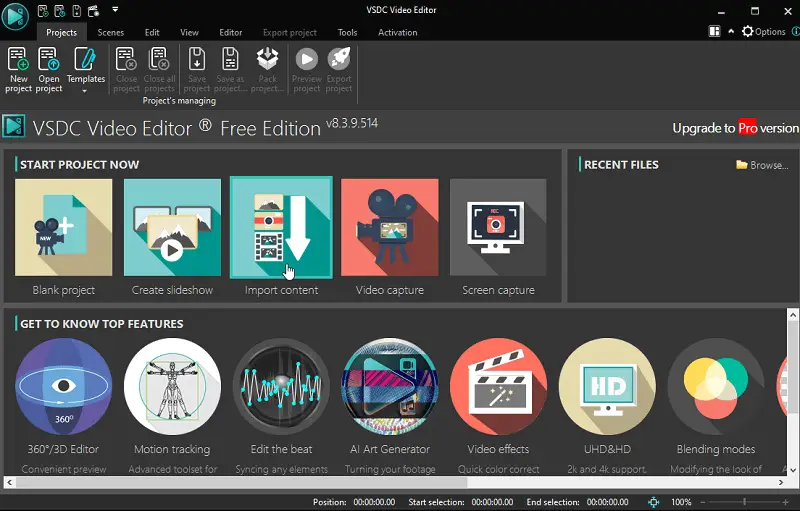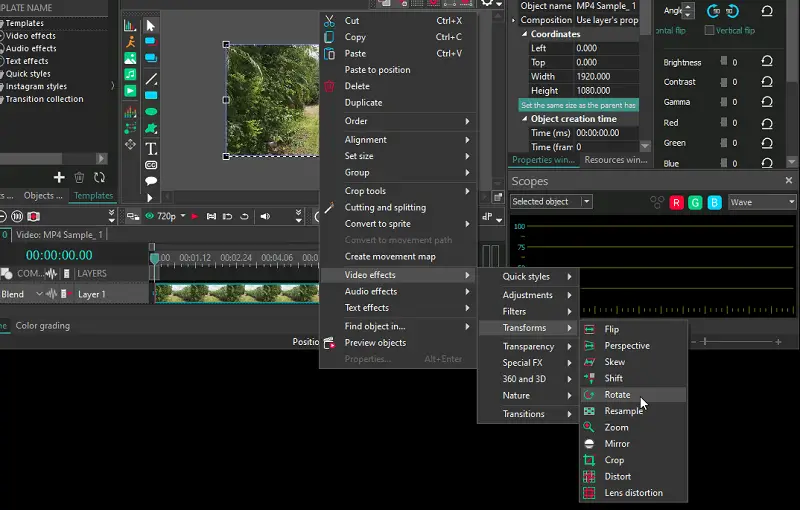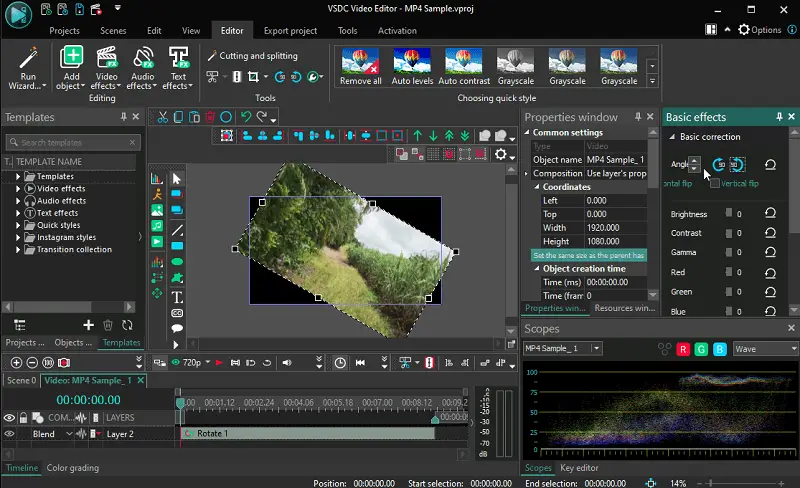How to Rotate a Video on a Windows PC
In the realm of digital content creation, videos are everywhere. However, occasionally, videos need adjustments, and one common task is rotating them.
Whether you need to correct an awkward angle or align with a specific platform's requirements, knowing how to rotate a video on Windows is a fundamental skill for any content creator.
In this concise guide, we'll walk you through the simple steps and best practices for rotating clips effortlessly, ensuring your content looks polished and professional.
Icecream Video Editor
Whether you want to correct the orientation of a mistakenly recorded clip or add a creative twist to your footage, this video editor for PC provides the way to rotate video in Windows. With its intuitive interface and robust set of features, it empowers users of all skill levels to create stunning videos with ease.
How to rotate a video on Windows with Icecream Video Editor
- Download free video editing software and install it.
- Add a video file for rotation by dragging and dropping it into the program's window. It is also possible to load the video with the "+Add files" button.
- Now, drag and drop the file from the "Media library" to the timeline to create a scene.
- To rotate a video scene, you need to select it on the timeline first.
- Press "General" over the timeline to open the panel with the settings. There are two options available: clockwise and anticlockwise video rotation. Each button will turn the video 90 degrees right and left accordingly.
- See the changes applied in the preview window. Hit "Done" to get back to the video project.
- When the clip is rotated to the right angle, press "Export video" to save the result.
Note:
- In most cases, the video editor will determine the proper clip orientation automatically.
- When you change the orientation of the video, you may get "blurred" bars because of the difference in aspect ratio. It is possible to change the blurred bars to black ones or enlarge the video to remove those by cropping the clip. You can also change the aspect ratio of the output video in the top-right corner of the program window if needed.
Pros:
- User-Friendly Interface. The video rotator boasts an intuitive interface, making it easy for beginners and experienced users alike to navigate the software efficiently.
- Efficiency. With this Windows program, rotating a video is a quick and straightforward process. You can achieve the desired orientation with just a few clicks.
- Video Quality. When turning a video with this app, you can rest assured that the quality of your footage will be preserved.
- Additional Editing Tools. In addition to rotation, it offers a range of editing features, such as cutting, trimming videos, and adding transitions.
- Compatibility. The video editing software supports a wide range of formats, ensuring compatibility with various devices and platforms.
VLC Media Player
VLC Media Player, commonly known as VLC, is a versatile and widely used multimedia player available for various platforms, including Windows, macOS, Linux, Android, and iOS. It is known for its ability to play a wide range of audio and video file formats. However, with its versatile features, it also allows you to rotate videos in a few mouse clicks.
How to change the orientation of a video in VLC
- Get the program from the official website and launch it.
- Navigate to the "Media" option in the menu bar and choose "Open File" to import the video you wish to rotate.
- Once the video is loaded, click "Tools" and pick "Effects and Filters" (or press Ctrl + E).
- In the "Adjustments and Effects" window, go to "Video Effects".
- Hit the "Geometry" tab.
- Check the box next to "Transform" to utilize the preset dimension. Alternatively, select "Rotate" to customize the angle.
- If opting for the first option, utilize the dropdown menu to choose the desired angle of rotation (e.g., 90/180 degrees, etc.). Alternatively, adjust the slider until achieving the desired angle.
- Tap "Close" to apply the rotation effect.
- Return to "Media" and select "Save" to retain the rotated video.
Pros:
- Manual Rotation. It allows manual adjustment of the rotation angle, giving users direct control over the process.
- Open-Source and Free. It is open-source software distributed under the GNU General Public License (GPL), making it freely available to users worldwide.
- Versatile. Apart from playing and rotating videos, VLC offers basic video editing functionalities, without requiring additional software.
- No Watermarks. Rotating a video with this method does not add any watermarks or branding to the clip, ensuring a clean output.
- Lightweight and Fast. VLC runs efficiently on most devices without consuming excessive system resources.
Cons:
- Performance Issues. You may experience performance issues, such as slow render times or possible crashes when you rotate heavy or high-resolution videos.
- Interface Complexity. Some users may find the app overwhelming due to its extensive feature set and customization options.
- Steep Learning Curve. Mastering all of VLC's features and functionalities may require some time and effort, particularly for novice users.
Movie Maker
Movie Maker is a video editing software developed by Microsoft for the Windows operating system. It was part of the Windows Essentials software suite, which included various multimedia applications.
How to turn video sideways in Movie Maker
- Look for the video editor in the search bar and open the app.
- Choose "Rotate" from the main menu and upload the video.
- Press "Rotate left" or "Rotate right" to adjust the video's orientation.
- Preview the rotated video.
- Hit "Save" to keep the changes.
Pros:
- Ease of Use. The program presents a simple and intuitive interface that lets you easily rotate a video in Windows without the need for complex editing skills.
- Free Software. It is a free video editing software without watermark that is designed for this operating system, making it accessible to users without additional purchases.
- Integration with Windows. As a native Windows application, Movie Maker seamlessly integrates with other features and services.
- Basic Editing Features. In addition to video rotation, it offers other editing functionalities such as trimming, splitting, and adding transitions.
Cons:
- Stability Concerns. Some users experience stability issues, such as crashes or freezes, particularly with large or high-resolution video files.
- No Longer Supported. Microsoft officially discontinued support for Movie Maker in 2017, meaning there are no further updates or improvements to the software.
- Output Quality. Turning a video may result in a slight loss of quality, especially if the rotation angle is significant or if the clip has already undergone previous edits.
VSDC Free Video Editor
VSDC Video Editor is a feature-rich software designed for Windows operating systems. It offers a wide range of tools and functionalities to create professional-looking videos, making it suitable for both beginners and experienced users.
How to rotate a video on Windows OS with VSDC Free Video Editor
- Install and open the program on your computer.
- Upload your video file by clicking "Import Content".
- Add the video to the timeline by dragging it from the project library.
- Navigate to "Video Effects", then "Transforms", and select "Rotate".
- In the popup window, ensure "Whole parent duration" is selected and press "OK".
- A new tab will appear on the timeline with the "Rotate" effect applied.
- Right-click on the effect tab and choose "Properties".
- Scroll down to "Rotate angles" and pick the desired angle.
- When you are satisfied with the result, export the video by following "Projects" > "Save as".
Pros:
- Precision Control. The software provides precise control over rotation angles, enabling users to adjust the orientation of videos with high accuracy.
- Multiple Tracks Support. The non-linear editing interface supports multiple tracks, allowing users to overlay rotated videos with other multimedia elements
- Editing Workflow. Turning videos within VSDC allows seamless integration with other editing features and functionalities, streamlining the overall process.
Cons:
- Learning Curve. The application's extensive feature set has a learning curve for new users, requiring time and effort to become proficient in using the software effectively.
- Resource Intensive. The rotation of long or HD videos can be a significant drain on system resources, resulting in poor performance.
- Complex Interface. The UI of the video editor can be overwhelming, with numerous buttons, options, and menus.
VideoPad
VideoPad features an easy-to-use interface that allows users to navigate through various editing functions effortlessly. It is available for Windows, Mac, iOS, and Android platforms, allowing users to seamlessly edit their projects across different devices.
How to rotate a video file on a computer using VideoPad
- Open the software. If you don't have it installed, you can download it.
- Import the desired video by clicking on "Add Files" or dragging the file.
- Right-click the video to open the menu. Locate "Rotate Clip".
- Select the angle.
- Once you are satisfied with the rotation, hit "Export" to save the resulting file.
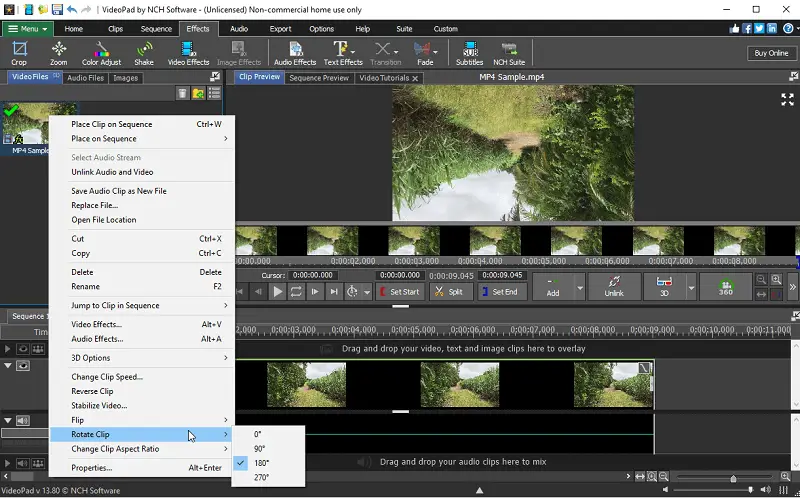
Pros:
- Editing Tools. Offers a plethora of video editing features, including trimming, splitting, merging, adjusting playback speed, and adding transitions between clips.
- Export Options. Once editing is complete, users can export their projects in various formats, resolutions, and aspect ratios.
- Support. Provides helpful tutorials and customer service to assist throughout the process.
Cons:
- Rotation Variations. VideoPad offers limited rotation options. You can rotate videos only in 90-degree increments.
- Limited Effects. The software has a restricted selection of visual effects.
- Slow Rendering Times. Rotating large or high-resolution videos may result in extended waiting times.
Clipchamp
Clipchamp functions as a reliable online video rotator, ideal for correcting orientation errors or creating mirrored effects. Whether your footage appears sideways, upside down, or simply needs a creative twist, the platform offers straightforward tools to adjust alignment.
How to turn video online using Clipchamp
- Visit the website and log in or make an account.
- Click "Create a new video" and select the desired aspect ratio for your project.
- Upload the footage by dragging it into the media area.
- Move the file to the timeline at the bottom of the workspace.
- Apply rotation with the arrow button. Also, you can right-click on the preview and pick "Rotate 90°" to turn it clockwise.
- Review your adjustments, then save and download the final version.
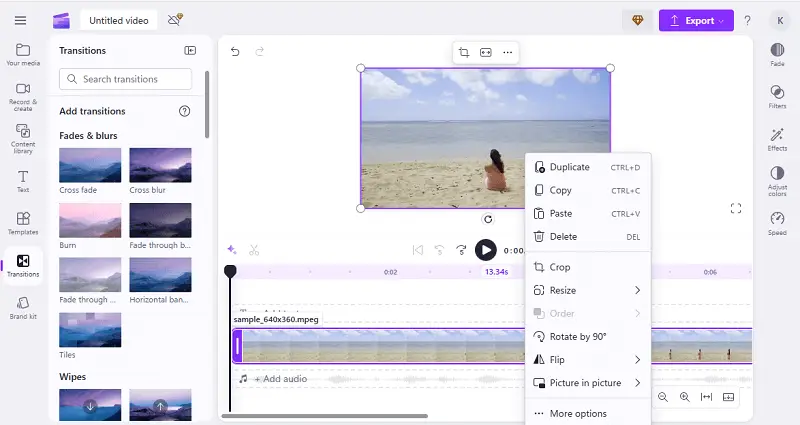
Pros:
- Browser-Based. No need to install software; everything works online.
- Free Access. Basic rotation and editing are available at no cost.
Cons:
- Feature Restrictions. Some advanced options like 4K export require a paid subscription.
- Limited Precision. Not designed for complex rotations or keyframe animations.
Tips on video rotation
- Select a video editor that fits your skill level and needs. Some tools offer quick rotation, while others provide more complex options for professional video editing.
- After rotating, ensure the aspect ratio remains the same. Some programs may crop or resize the video, so make sure it’s properly adjusted to avoid distortion.
- Export the result in a format that suits your use (e.g., MP4 for online sharing). Pay attention to the quality settings to avoid degrading the resolution.
- Many video editing programs have shortcuts for various tasks. Familiarize yourself with these to speed up the process.
- Typically, clips are rotated by 90 degrees, but some software allows for smaller angle adjustments (like 15), which can be useful for slight fixes to tilted footage.
Rotate a video: FAQ
- Is it possible to rotate a clip without losing quality?
- In most cases, turning a video does not significantly affect its quality. However, repeated rotations or extreme angles may lead to some degradation. It's always a good idea to preview the rotated video before saving it to ensure satisfactory quality.
- How do I know which angle to rotate my video?
- The angle you need depends on the original orientation and how you want the final result to appear. Experiment with different angles or use a preview feature to see how the video looks before saving it.
- Will rotating a video change its aspect ratio?
- If you change the orientation of the video by 90 or 270 degrees, the aspect ratio may appear different.
- Does rotating a video affect the video speed?
- Turning a clip typically does not alter its playback speed. However, if you use certain features like time remapping or speed adjustment in conjunction with rotation, it may alter the playback.
- Does video rotation have an effect on its file size?
- The rotation of a video itself has no impact on the size. If you choose to export the rotated video with different compression settings or in another format, it may change the file size.
- Can I rotate a video taken in portrait mode to landscape mode?
- Yes, simply rotate it 90 degrees counterclockwise or clockwise, depending on the desired orientation, and then save it. Keep in mind that rotating a portrait video to a landscape may result in black bars on the sides due to the difference in aspect ratio.
- Is rotating a video the same as flipping it?
- No, rotating changes the angle (e.g., 90 degrees), while flipping mirrors the video horizontally or vertically.
- How do I rotate a video on Instagram?
- Instagram doesn't allow video rotation directly. You need to change its orientation before uploading using an external app.
How to rotate a video: conclusion
In conclusion, rotating a video on Windows is a simple yet essential task that can greatly enhance the viewing experience and overall quality of your videos.
From built-in options in popular media players like VLC to dedicated video editing software such as Icecream Video Editor, users have a plethora of variants to choose from based on their specific needs and preferences.
So, explore the tools and techniques outlined in this guide and start rotating your videos to elevate your editing skills and captivate your audience.
Co-authors



